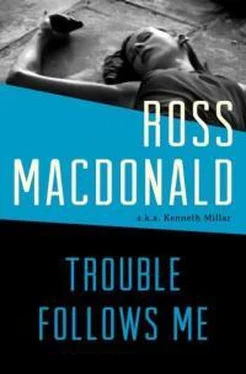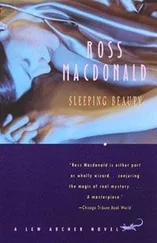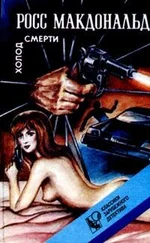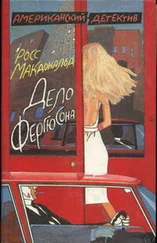“I know. We came on this trip together to have fun. I’m sorry it hasn’t worked out that way so far.”
“It never will,” she said bitterly.
“Maybe I’m not as callous as I thought. I can’t forget about the things that have happened. Or maybe it’s just that last night they started to happen to me.”
“Aren’t you afraid?” Her wide stare searched my face.
“Yes. I’m afraid. But from now on I’m going to be more careful. Eventually I’m going to get my hands on somebody or something that I’ll take great pleasure in choking to death.”
“You make me shudder.” She smiled palely, but her hand had involuntarily gone to her throat.
“Did I scare you? I’m sorry.”
I looked around, decided that our compartment gave us enough privacy, and kissed her. Her head went down to my shoulder and her bright hair tickled my face. With my arms around her I could feel a light shiver run along her back. She leaned towards me and we held each other close. I breathed through her fragrant hair. I felt that she was more precious to me than a part of my own body. She said: “Don’t ever let me go.”
“Excuse me,” Mrs. Tessinger said. She was standing in the aisle, smiling down at us with exaggerated tolerance.
We separated quickly, and Mary’s hands went automatically to her hair. I started to light a cigarette, then remembered that smoking was forbidden in the Pullman.
“I didn’t mean to butt in,” Mrs. Tessinger said. “Would you two care to have dinner with us tonight?”
Mary looked at me and giggled. “Sam. There’s lipstick on your mouth. Here, let me take it off.”
She dabbed at my face with a handkerchief. I surreptitiously kissed her hand.
We had dinner with the Tessingers. Teddy Trask, who was inseparable from them by this time, made a fifth on a chair placed in the aisle. Mrs. Tessinger was extraordinarily vivacious. Her bosom seemed higher than ever, and her waist tighter. Rita sat by the window with an air of being left out of things. Every now and then she gave her mother a black glance edged with malice.
“I was so hoping you’d give us another performance this afternoon,” Mrs. Tessinger said to Teddy. “Why did you let us down?”
“I didn’t feel in the mood, after that nasty business last night. I guess not many other people did either.” He looked pointedly at me.
“Do you really think you and that soldier were deliberately poisoned, Mr. Drake?”
“I don’t know. The authorities don’t seem to think so.”
“I think Mr. Drake would rather talk about something else, Mother. The subject must be painful to him.”
“The experience was painful,” I said. “The subject isn’t particularly. I’m afraid I can’t be very entertaining on that topic, though.”
“Teddy, do tell Mr. Drake and Miss Thompson those glorious shaggy-dog stories of yours. This man is priceless,” Mrs. Tessinger said to us.
“But we’ve heard those stories, Mother.”
“I’m sure that Miss Thompson and Mr. Drake haven’t heard them. Even if they have, the way Teddy tells them, they’re very well worth hearing again. Teddy, I insist.”
With a deprecating smile, Teddy told a long and involved shaggy-dog story about a man who worked in a zoo and couldn’t remember the names of the animals. Mrs. Tessinger kept up a low tittering. Rita looked out of the window. Mary watched the three of them with a faint smile on her lips.
He told the story well, but I couldn’t keep my mind on it. Something kept prodding at my attention from below, an unremembered fact in my unconscious which insisted on its importance and clamored to be remembered. When Anderson and Miss Green moved past us down the aisle, her junk jewelry tinkling like faint facetious sleighbells, I realized what it was.
Hatcher had said something about Anderson before he died, something which seemed to indicate that he knew him. The possible implications of this, strengthened, if anything, by Anderson’s denial, hit me suddenly and hard.
Anderson had sat down a few tables away, with his broad impassive back to me. I felt like getting up and going to him then. But I stayed where I was, watching the plump whitish wrinkles in the back of his reddish neck, wondering what went on under that thin barbered hair, inside that stolid head.
Mary’s hand found mine under the table. “What’s the matter, Sam?” she said in a whisper.
“Nothing. I was just thinking.”
“You’ve got a dreadfully one-track mind.”
“I guess I have.”
The story ceased, and we laughed dutifully, except for Rita. As if to convince herself of her own existence, she launched into a rapid strained monologue on all the things she was going to do in La Jolla, and what fun she was going to have. Mrs. Tessinger and Teddy exchanged long queer looks.
Then Teddy talked about his practically front-line experience in France. Mrs. Tessinger wreathed herself in girlish graces. Teddy seemed larger than he had the day before, as if somebody had blown air into him. I liked him better small.
Mary and I excused ourselves when we could, and made our way back to the Pullman. When Anderson came back with Miss Green, I went to him and told him I wanted to talk to him.
“Absolutely, old son,” he said. “Any time. I hear you had some trouble on the train last night.”
“Trouble is the word. Would you mind coming down to the smoking-room? There’s nobody there just now.”
“If you’ll excuse me, Miss Green?”
“Oh, don’t mind me. I’ve got a love-story magazine to read.”
When we were seated in the smoking-room and Anderson had lit a cigar, I said: “Private Hatcher, the man who died last night, seemed to know you. Did you know him?”
“He must’ve made a mistake. I told you I never saw him before in my life.” Anderson’s smooth plump face was unruffled. His pale blue eyes were alert.
I said quickly on a hunch: “How did you get out of Shanghai?”
Preceding his statement by a pause of just the right length, he said with just the right combination of puzzlement and irritation: “But I’ve never been to Shanghai. What are you trying to get at?”
I was sitting on the leather seat beside Anderson, half-facing the door. There was no audible sound in the passageway, and no visible movement, but a subtle combination of sight and hearing made me conscious that someone was there. I got up and crossed to the door in one motion, and faced the dark man again.
I said in a voice that was ready to break with cumulative anger: “I’m getting bored with having a shadow. Get out of here.”
His face was unmoved. He said softly: “Excuse me. I didn’t realize that you were in a position of authority on this train.”
“That has nothing to do with it. If I catch you eavesdropping again I’m going to slug you.”
“If you slug me, as you so elegantly put it, I’ll have you arrested. I may even slug you in return.”
His black eyes were hard, steady and impenetrable. I felt an urgent need to surround them with matching black rings. But if I did, the Shore Patrol would put me off the train. My frustration was so strong and bitter that it gathered in a lump in my throat. I left him standing there and went back into the smoking-room.
“Let me give you a word of advice,” said Anderson, who hadn’t moved from his seat or shifted his cigar. “You’re all keyed up, and I can’t say I blame you. But if you keep on going around insulting people like this, you’re going to get into a peck of trouble. Just now you practically accused me of having something to do with that soldier’s death. A minute later you accused that young man of eavesdropping. I know you had a tough time last night, but don’t let it make a crank out of you.”
Читать дальше







